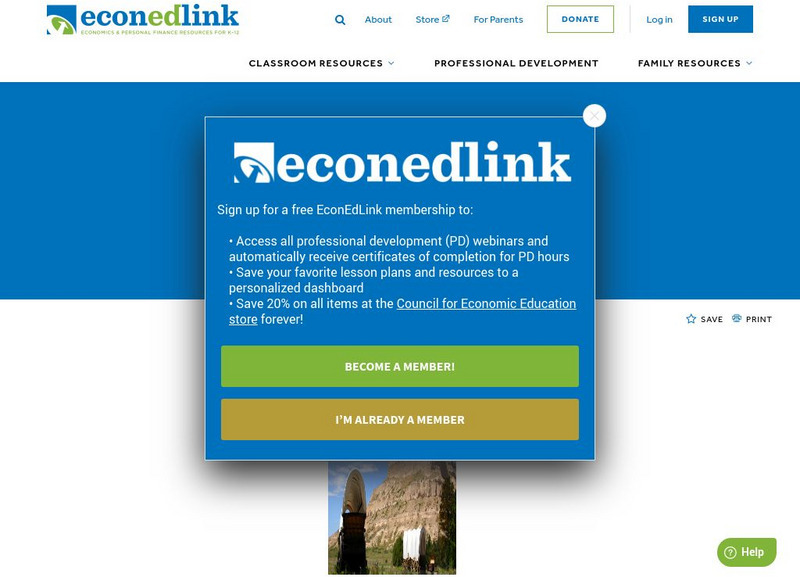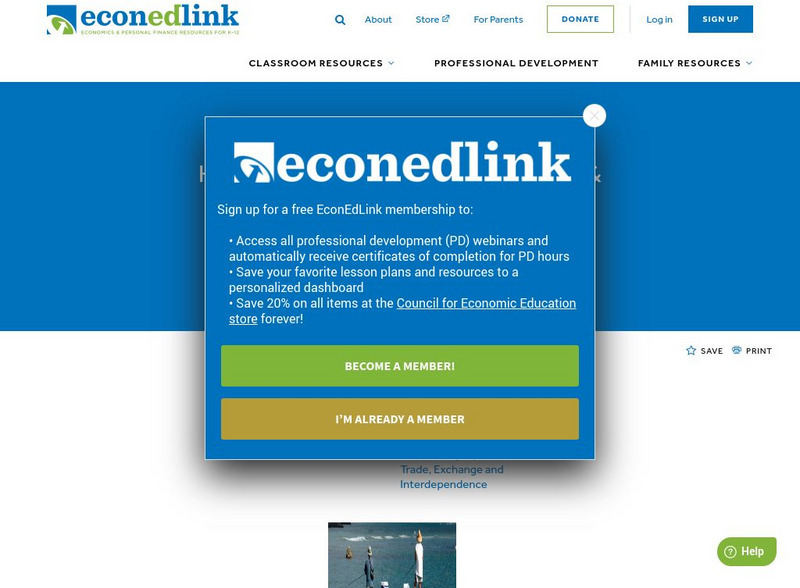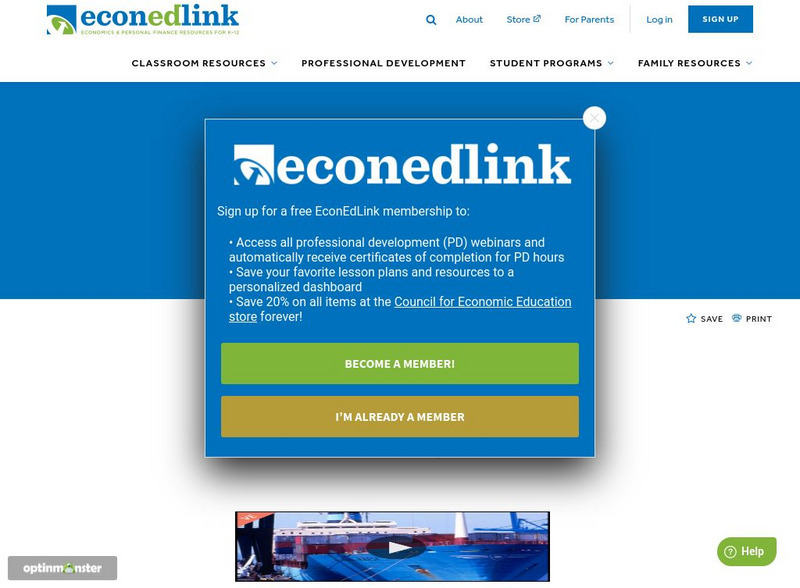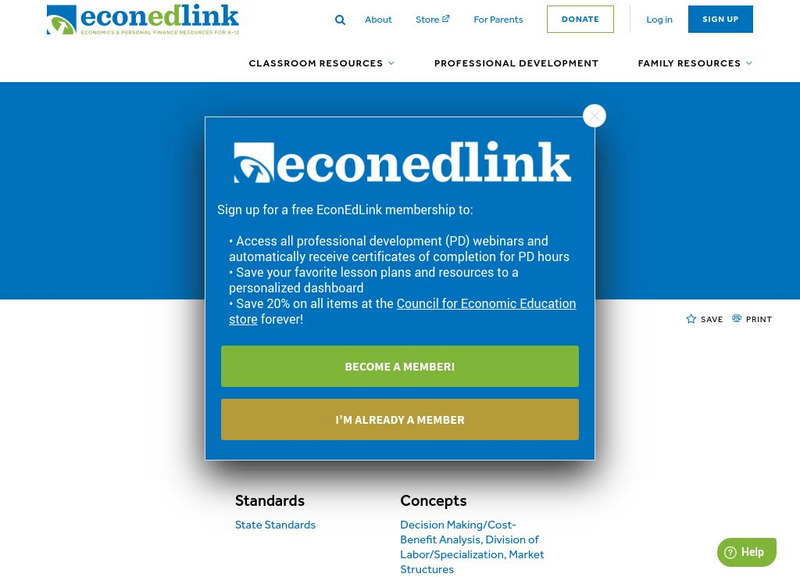Council for Economic Education
Econ Ed Link: Off to Interactive Island
This site is a lesson that teaches students about scarcity and choice. Students participate in a simulation where they are asked to make choices about what they want to take with them in order to survive.
Council for Economic Education
Econ Ed Link: Nothing to Buy
This site is a printable activity that compares the command economy of Soviet Russia with the market economy of present day Russia. Lesson provides tables with data comparing prices within the two systems. Discussion questions are also...
Council for Economic Education
Econ Ed Link: Hawaiian Economics: Barter for Fish & Poi
In ancient Hawaii, chiefs managed the economy by creating a land division system, the Ahupua'a, which divided the islands into pie slice shapes. Each Ahupua'a covered the three main regions of the islands: the mountains, the valleys, and...
Council for Economic Education
Econ Ed Link: Hawaiian Economics: Barter for Fish & Poi
Use this instructional activity to learn more about the Hawaiian economics system. Learn how they developed and used this specialized type of money system. "In this instructional activity, you will learn how specialization and division...
Council for Economic Education
Econ Ed Link: Dynamic Decision Making
Students will be introduced to the PACED Model and learn to use the parts of the model-- Problem, Alternatives, Criteria, and Evaluation- in solving problems and making decisions. They will practice using the model in decisions about...
Council for Economic Education
Econ Ed Link: Demand Shifters
Check out this informative economics lesson plan that teaches about demand, and factors that cause demand for a good or service to change. Students learn to recognize factors that influence one's behavior as a consumer.
Council for Economic Education
Econ Ed Link: A Penny Saved Is a Penny at 4.7% Earned
There are lots of ways to receive income, and lots of ways to spend it. In this EconomicsMinute you will develop two budgets to help you decide how to allocate your income. Assuming you do not love making dollar bill rings.
Council for Economic Education
Econ Ed Link: A Penny Saved Is a Penny at 4.7% Earned
This is a instructional activity from EconEdLink where students learn about saving money. Includes activities and materials.
Council for Economic Education
Econ Ed Link: Climbing the Savings Mountain
Young scholars discover how saving money can be compared to a mountain climb. The climb can be fast or slow, safe or hazardous, scenic or thrilling. You will find out that there is more than one way to get to the top!
Council for Economic Education
Econ Ed Link: Climbing the Savings Mountain
Check out this lesson plan to learn how to develop a savings plan that is right for you.
Council for Economic Education
Econ Ed Link: Transportation: They Say We Had a Revolution (Part 2)
Advancements in transportation have played a key role in the growth of our nation. U.S.government policies have also had a considerable impact on the development of transport as we know it today. In this series of three lessons, the...
Council for Economic Education
Econ Ed Link: Don't Fence Me Out! (Barriers to Trade)
We tend to see the United States as a country with free trade. Although we do have a great deal of freedom to enter new markets, there are barriers to trade that limit consumer choice. This lesson explores these barriers and how they work.
Council for Economic Education
Econ Ed Link: Peanuts, Pecans, and Peas, Please (Lesson)
Check out this informative site that looks at the world of the peanut. This tiny nut had a great influence on our economy. Find out how George Washington Carver changed the economy of the South with his research on the lowly peanut.
Council for Economic Education
Econ Ed Link: Green Eggs and Economics?
Economic concepts are often found in places students have never considered, like children's literature. In this instructional activity, students will explore the various economic concepts addressed in five of Dr. Seuss' most popular...
Council for Economic Education
Econ Ed Link: An Investigation of Regional Housing Costs
This lesson plan has young scholars explore differences in regional housing costs, determine the percentage of gross income spent on housing, assess the impact of housing costs on a relocation decision and recognize wages and housing...
Council for Economic Education
Econ Ed Link: How E Commerce Influences Consumer Choice
In this lesson students learn decision making skills that will help them become better consumers. As consumers they have a variety of alternatives from which to choose. They learn about the importance of price information in making their...
Council for Economic Education
Econ Ed Link: Old Toy New Market
Students explore the LEGOLAND theme parks and demonstrate an understanding of how new markets can be created and that cultural and social differences can affect these markets.
Council for Economic Education
Econ Ed Link: Supply and Demand, Lessons From Toy Fads.
The concepts of supply and demand and related terms are taught through stories about the toy fads of Hula Hoops and Silly Bandz. In 1958, Wham-O, Inc. began marketing the Hula Hoop in the United States and sales of the Hula Hoops...
Council for Economic Education
Econ Ed Link: Business Ownership: How Sweet It Can Be!
In this lesson, students research the three basic types of business organization: sole proprietorships, partnerships, and corporations. Considering the advantages and disadvantages of each, they function as consultants offering advice on...
Council for Economic Education
Econ Ed Link: Transportation: They Say We Had a Revolution (Part 3)
Advancements in transportation have played a key role in the growth of our nation. U.S. government policies have also had a considerable impact on the development of transport as we know it today. In this series of three lessons, the...
Council for Economic Education
Econ Ed Link: The Credit Card Mystery
Credit Cards are a risky business these days, especially for students and those holding multiple cards. Interest rates on credit card balances have always been high relative to other rates, for several reasons. Despite this, there is...
Council for Economic Education
Econ Ed Link: Closing the Gap
The students learn what GDP is. They will learn different measures of GDP as well as how GDP per capita can be used to compare countries. They will also calculate GDP per capita and learn how poorer countries can converge, or close the...
Council for Economic Education
Econ Ed Link: Traditional Economies and the Inuit
The Inuit people of northern Canada provide an example of a traditional economy. For thousands of years, Inuit parents have taught their children the survival skills needed to survive in the Arctic Circle's severe climate. Students will...
Council for Economic Education
Econ Ed Link: The Economics of Recycling
Students will review the legislation in Japan that requires all consumers to pay a fee for recycling large appliances.













